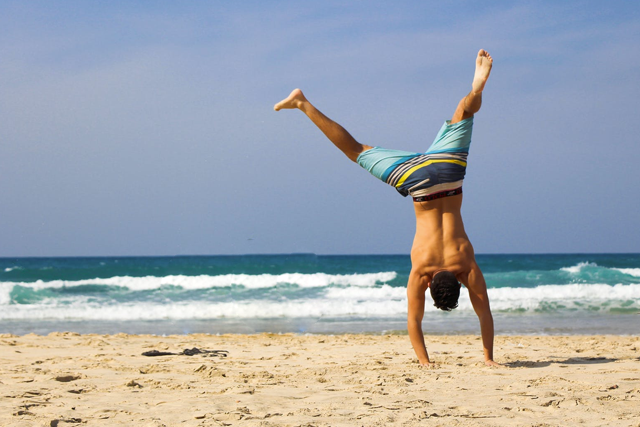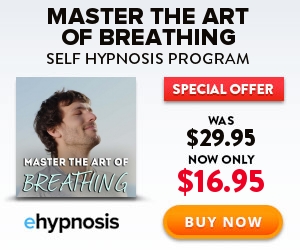
Do you think that you usually breath correctly?
Do you know there are breathing exercises that can help to boost physical and mental well-being?
If you were having a panic attack, would you know how to calm yourself down?
Are you aware that self-hypnosis can help you learn how to breathe correctly?
If your answer to any of these questions is “no”, then this article should motivate you to learn how to master the art of breathing. There are a lot of benefits to learning breathing exercises for stress, anxiety and much more. As we’ll see, deep breathing is proven to boost mental and physical well-being in some surprising ways.
Why Are Breathing Exercises Important?
From yoga practitioners to Shaolin monks, many traditions and professionals are aware of the importance of the breath and how many benefits breathing well can provide.
Using the proper breathing technique is important for maintaining optimal health.
Breathing exercises and breath, in general, are extremely important for us and if not done properly, it can even lead to negative reactions from our body.
For example, when we hyperventilate (taking fast, sharp breaths), we can sometimes faint, feel numb or tingly and even have loss of control.
This just shows how important breathing correctly is and the effects it can have on our body! Let’s now turn to consider the science behind the importance of breathing correctly.
Understanding Why Deep Breathing Matters
Your lungs are responsible for dispersing oxygen into your blood, so that it can then be delivered to all of your cells and vital organs.
When you breathe in and out, your diaphragm (the muscle under your ribs) expands and contracts to ensure you take in enough oxygen.
If you don’t take deep, even breaths, then it’s possible for your lungs to lose elasticity over time. This promotes short, shallow breaths that limit how much oxygen makes its way around your body.
So, how should you breathe instead?
While there are many different breathing exercises, the most basic change to breathing is called diaphragmatic breathing.
You can think of this as “breathing from your belly” - after all, the diaphragm is right around your stomach area.
When you do diaphragmatic breathing, you’ll notice how your chest and ribcage expand. After a few such breaths, you might even start to notice how this way of breathing calms the body.
Focusing on using the diaphragm muscle when breathing allows you to pull much more air into your body.
If you make a habit of taking deep, slow breaths, you actively enhance and boost the functionality of your lungs. You strengthen the muscles under your ribs, and your cells get all the oxygen they need.
This type of breathing forms the basis of most meditation and yoga breathing practices, though there are ways to make it even more effective and powerful. We’ll return to those later.

11 Benefits Of Breathing Exercises
As you are probably aware by now, breathing has many different benefits - helping us achieve optimal health is just one of them. But there are many more benefits that breathing exercises and breathing properly can give us.
Here is a list of 11 of the most exciting benefits of breathing exercises and how they can help you in different ways.
1. Releases Muscle Tension
When you are stressed or feeling anxious, your body can tense up and you can feel quite stiff and uncomfortable.
This is because we are experiencing muscle tension - and stress and anxiety can cause this. Even if there is no real threat, anxiety makes your body act as though you are in danger.
However, breathing exercises can really help to release muscle tension and communicate to your body that it is safe to relax.
When you take slow, deep breaths your muscles will relax and your body will loosen up, especially if you are experiencing anxiety.
When your breath is shallow your muscle tissue contracts, but when we breathe correctly (deep breathing) it can help to release this.
So, if you feel that you are experiencing muscle tension, you could try to become aware of how you are breathing and if you are not breathing correctly, start to take deep breaths as this can help relieve your muscle tension.

2. Lowers Blood Pressure
High blood pressure is associated with an increased risk of heart attacks, heart disease and strokes.
Unfortunately, many of us have higher than ideal blood pressure, especially when we feel overwhelmed.
Stress and anxiety can sometimes raise blood pressure, and with stress and anxiety usually comes short, shallow breathing, which is why we should do the opposite.
When you take deep and slow breaths it can regulate your heart rate and also improve your blood flow - all of this helps to reduce your blood pressure.
As we have already mentioned, deep breathing helps with stress. Stress reduction can also help to reduce blood pressure, so this shows us that controlled breathing exercises can only benefit our blood pressure.
You could even make sure to take some slow deep breaths for a few minutes a day in order to help lower blood pressure, reduce your stress and stay healthy.
3. Helps With Anxiety And Stress
Panic attacks can be very frightening and stressful. When we are faced with high anxiety, during anxiety attacks, we tend to take short, shallow breaths. However, this sort of breathing doesn’t do us any favors.
This can even make anxiety attacks worse and you could feel faint or numb.
People going through panic attacks often become convinced that they’re dying, such is the level of panic and distress they feel.
As breathing exercises help to reduce stress and anxiety, it’s no wonder that controlled breathing can also really help during a panic or anxiety attack.
If you take deep and slow breaths whilst you are facing anxiety, this can relax your muscles and calm your body down. You might be in flight or fight mode and deep controlled breathing can help you to relax and change how you feel physically and even mentally.
Specifically, deep breathing exercises engage your parasympathetic nervous system, which makes you more relaxed.

4. Improves The Cardiovascular System
Controlled breathing exercises can really improve the cardiovascular system.
When we are taking deep breaths, our lungs will expand and contract which will then massage your heart as you breathe.
When we take deep breaths or practice breathing exercises, our lungs provide us with more oxygen to the blood which will then get sent to our heart.
This means that our heart won't need to work as hard to pump blood around the body. This can all help to improve your circulation and eases the pressure needed by the heart.
Evidence shows that deep breathing can make a significant difference to heart health. For example, one research project that looked at heart attack survivors found that 100% of the patients breathed from their chest rather than their diaphragm.
A related study showed that patients who started breath training reduced their risk of a future heart attack by around 50%.
5. Can Ease Pain
Chronic pain is extremely common. Whether you have an old injury that flares up from time to time, struggle with an inflammatory disease like arthritis or have been diagnosed with a challenging condition like fibromyalgia, it’s likely that you spend much of your life in pain.
Another benefit of practicing breathing exercises is that it can actually help to ease pain. This is because deep and slow breathing releases endorphins into our bodies. Endorphins are hormones that are natural painkillers for the body.
Our natural instinct is to hold our breath when we are in pain, but actually breathing into the pain can help to ease it. It may be hard at first, but if you can learn to take back control of your breathing when you are in pain, the pain should ease more quickly than if you were to tense up or hold your breath.
In addition, deep breathing boosts digestive function in a way that may reduce pain in your stomach and intestines. This is likely to be because deep breathing helps to ensure that more oxygen reaches all of your vital organs (including your digestive system).
In theory, this may improve the rate and comfort of digestion, which can lead to fewer stomach aches, a reduction in bloating, and less trapped wind.

6. Slows Down Aging
If you think about how you behave when you are stressed or angry, chances are you might be frowning and increasing the wrinkles and lines on your face. Well, because deep breathing helps to reduce stress, it can also help us to slow down the aging process by reducing the amount of time we spend making these tense facial expressions.
Our breathing can also slow down aging by increasing the release of anti-aging hormones we have. As it also reduces stress and can improve our mood, this also helps to increase the levels of serotonin and endorphins into our body.
All of this means that we should feel more positive, less stressed and we should experience fewer wrinkles due to the improved circulation we get from breathing exercises. And looking younger can help us feel more energetic, positive and confident.
7. Can Help You Release Negative Emotions
Sheetali Pranayama (or “cooling breath”) is a specific breathing technique that can help you calm down and expel anger. It aims to let out built up rage, rebalancing your emotions and clearing your head.
This straightforward exercise can be practiced at home. All you need to do is get into a comfortable position in a quiet place where you won’t be disturbed, then deliberately relax your face. Notice if your teeth are clenched - allow your jaw to drop, and curl your tongue in on itself to help the muscles relax.
Next, inhale a deep breath to count of five, breathing in through your mouth from the bottom of your ribcage. Hold your breath for a couple of seconds, then exhale through your nose to a count of seven.
You can repeat this as many times as you like, and return to it any time you feel a buildup of anger or frustration.

8. Improves Your Posture
In some cases, poor posture results from breathing in the wrong way. When we take in short, shallow breaths, we tend to hunch over and our shoulders become rounded.
In contrast, when you start to breathe deeply and from your diaphragm, you’ll notice that your spine lengthens and straightens.
When you regularly practice breathing exercises, it becomes the norm to breathe correctly. You’ll start to do so automatically, and this means adopting good posture more of the time.
Over weeks and months, you may start to notice that fewer aches and pains in your back and neck, as well as a reduction in the frequency of tension headaches. Good posture also tends to make us feel more assertive and empowered, which is helpful in all areas of life.
9. Boosts energy
All of our cells need oxygen in order to function optimally. While we’re able to go for as long as 40 days without eating and can even survive on no water for up to three days, a mere few minutes without oxygen can kill us.
Many proponents of deep breathing say that the increased oxygen can lead to a tangible difference in energy levels, helping to improve mood and motivation as well as increasing mental alertness. These are benefits that you might even notice in a single day of improved breathing.
Relatedly, mastering the art of breathing can improve your stamina. This can help you increase your physical fitness, as you’ll be able to work out at a higher intensity for longer amounts of time.

10. Promotes Restful Sleep
Breathing in the right way helps you to get into the right frame of mind for sleeping, helping you to fall asleep more quickly. This is especially important if you have a busy life and need to make the most of your time in bed.
If you’ve previously struggled with insomnia, you may find that changing your approach to breathing makes you feel much calmer when you go to bed. Due to the above benefits of reduced anxiety and diminished muscle tension, you’ll be fully relaxed.
Focusing on breathing exercises can also help you slow your mind and stop racing thoughts. If you count while you inhale and exhale, distractions will fall away and you’ll gradually drift off to sleep.
11. Can Give You the Benefits of Meditation
Finally, breathing exercises can easily form the basis of a meditation practice. In fact, some beginner’s level mindfulness exercises focus entirely on deep breathing.
While you might imagine that you need to be an expert meditator to notice any real change to your thoughts and feelings, there is good evidence to suppose that even simple approaches to mindfulness can change the body in dramatic ways.
There are dozens of documented health benefits of meditation and mindfulness, many of which overlap with the above (such as improved heart health and reduced anxiety). In addition, mindfulness appears to boost immune system function, enhance concentration and promote sharper memory.
Emotionally, there are also huge benefits. For example, those who regularly meditate are better at putting difficulties into perspective, and report a greater sense of peace and self-acceptance. Compassion can also be enhanced, along with a clearer sense of purpose and a more patient attitude to conflict.
In sum, making a habit of doing deep breathing exercises can promote not only physical well-being but also personal growth and emotional maturity.

You Can Master The Art Of Breathing With Self Hypnosis
As is obvious from the above, mastering the art of breathing is a powerful way to improve every aspect of your life - physical, mental and emotional. And as it turns out, self-hypnosis is the ideal way to become better at deep breathing.
Self-hypnosis is a great way to make positive changes in your life, such as learning to breathe properly. Unlike attending sessions with a hypnotherapist, you can practice self-hypnosis at any time, and in the privacy of your own home. You can also listen to sessions multiple times a day if you desire.
You can learn how to become more relaxed and take control of your breathing. Because hypnosis accesses the subconscious mind, it can circumvent some of your mind’s defense mechanisms and help you to learn deep breathing more quickly than traditional methods.
Using self-hypnosis for controlling your breathing can also help you to feel more relaxed and know how to change your breathing in times of stress or anxiety. By changing parts of your subconscious mind that deals with conducting your breath, self-hypnosis can be a highly effective tool.
You should see that you are starting to experience positive changes to your behavior when it comes to breathing and you should feel more relaxed and at peace too, after listening to the self-hypnosis track.


